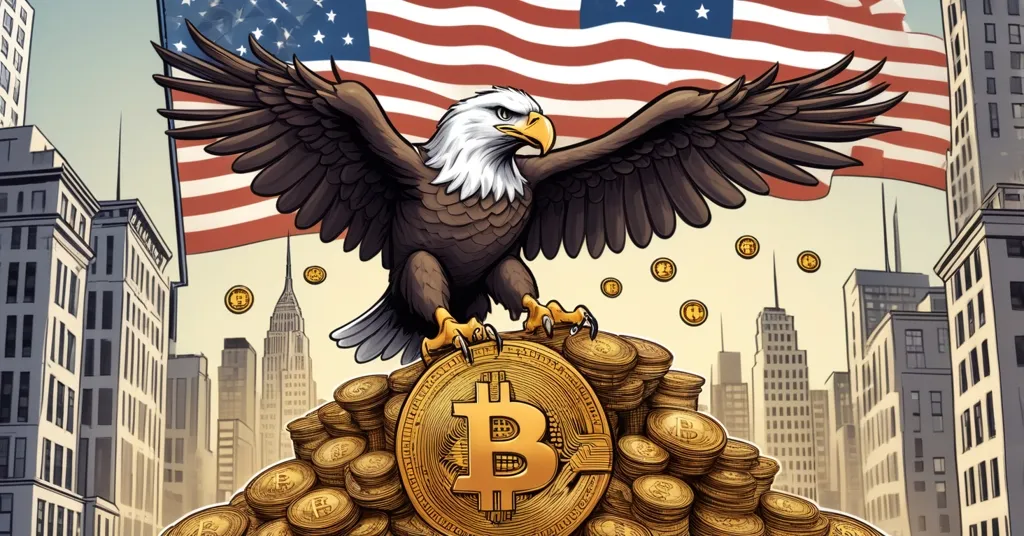Trump’s Crypto Policy: U.S. Aims for Global Crypto Capital Status

Trump’s Crypto Policy: A Game Changer for Investors?
President Donald Trump’s bold moves into the cryptocurrency arena have set the stage for significant shifts in the market, sparking a mix of enthusiasm and caution among investors. As the U.S. strives to become the global hub for digital assets, the ripple effects are profound and multifaceted.
- Trump’s goal: U.S. as the “crypto capital of the planet.”
- Establishment of a strategic Bitcoin reserve.
- 42% of Gen Z investors in the U.S. own cryptocurrency.
- Bitcoin’s volatility persists despite policy support.
Trump’s administration has taken decisive steps to cement the U.S.’s position in the growing crypto market. By appointing a cryptocurrency czar—a dedicated official to oversee the nation’s digital asset strategy—and issuing executive orders to bolster financial technology, Trump’s intent to lead in the digital asset space is clear. A standout policy is the creation of a strategic Bitcoin reserve, a move that not only legitimizes Bitcoin as a mainstream financial instrument but also positions the U.S. government as a key player in the crypto market. Essentially, this reserve serves as a digital equivalent of the strategic petroleum reserve, capitalizing on forfeited Bitcoin to bolster national reserves without selling it off.
This policy shift has resonated well with younger investors. A 2024 YouGov survey revealed that 42% of Gen Z investors in the U.S. now hold cryptocurrencies, showcasing a new wave of enthusiasm among this demographic. These investors, often more tech-savvy and open to risk, are drawn to the potential of digital assets to disrupt traditional finance. While the YouGov report also notes that 65% of Gen Z plan to invest in 2025 despite viewing crypto as a risky investment, the allure of being part of a financial revolution is undeniable.
Despite Trump’s supportive stance, Bitcoin’s inherent volatility remains a challenge. Following Trump’s election victory, Bitcoin prices soared over US$100,000, only to later dip below US$80,000. This wild ride underscores the speculative nature of cryptocurrencies and the risks they carry, even with governmental backing. Bitcoin’s price swings are a headache, even with Trump’s backing, highlighting the market’s unpredictable nature.
As investors navigate these turbulent waters, they’re not just sticking to Bitcoin. Many are exploring other digital assets, including Ethereum and even meme coins inspired by Trump’s persona. This diversification reflects the broader trend of crypto adoption but also highlights the speculative excitement that can accompany such investments. Ethereum, often considered the “world computer” for its smart contract capabilities, serves as a platform for decentralized applications, filling a niche that Bitcoin does not.
On the regulatory front, the U.S. Securities and Exchange Commission (SEC) has shown signs of softening its stance on certain crypto assets, though it continues to regulate others stringently. Clearer regulations could indeed attract more institutional investors, providing the stability and legitimacy that many in the crypto space crave. However, the government’s increasing involvement, particularly through the strategic Bitcoin reserve, raises concerns about the potential erosion of the decentralization that lies at the heart of cryptocurrencies. Decentralization means that no single entity controls the network, which is a fundamental tenet of Bitcoin’s ethos.
Investors must tread carefully, balancing the opportunities presented by Trump’s crypto-friendly policies against the risks of market volatility, security threats, and potential regulatory changes. The allure of being part of a financial revolution is strong, but it comes with its own set of challenges that require a keen eye and a robust risk management strategy.
This shift in U.S. policy is also sparking interest beyond its borders. In Canada, for instance, Trump’s influence is driving crypto enthusiasts to explore digital assets, despite differing regulatory landscapes. It’s a testament to the global impact of U.S. policy on the crypto market.
Looking to the future, the crypto landscape under Trump’s leadership is poised for both growth and turbulence. The promise of a more crypto-friendly U.S. could pave the way for significant advancements in digital finance, but it also demands vigilance and adaptability from investors. The long-term effects of these policies could include increased adoption of digital assets and shifts in regulatory frameworks, shaping the crypto ecosystem in profound ways.
While Bitcoin maximalists might celebrate these moves as a step towards mainstream adoption, it’s crucial to recognize the roles of other cryptocurrencies like Ethereum, which bring unique functionalities to the table. The broader crypto ecosystem thrives on diversity, with each coin or token serving its purpose and niche.
As we navigate this new landscape, it’s essential to maintain a balanced perspective. Trump’s policies could be a game changer, but they also introduce new complexities. The excitement around crypto must be tempered with a realistic understanding of its risks and challenges.
Key Takeaways and Questions
- What is Trump’s goal regarding cryptocurrency?
Trump aims to position the United States as the “crypto capital of the planet” by promoting digital assets and supporting financial technology.
- What significant policy move did Trump’s administration make regarding Bitcoin?
Trump’s administration established a strategic Bitcoin reserve, signaling a move toward legitimizing digital assets as mainstream financial instruments.
- How has Trump’s crypto policy influenced younger investors?
Trump’s crypto-friendly stance has encouraged a new wave of enthusiasm among younger generations, particularly Gen Z, with 42% owning cryptocurrency according to a 2024 survey.
- What has been the impact of Trump’s policies on Bitcoin prices?
Bitcoin prices have experienced volatility, initially soaring past US$100,000 following Trump’s election victory but later dipping below US$80,000.
- What are the potential benefits and risks of Trump’s crypto policy for investors?
Benefits include potential regulatory clarity that could attract institutional investors, while risks involve market volatility, security threats, and concerns about government influence over digital currencies.
- How might the creation of a U.S. Bitcoin reserve affect the cryptocurrency market?
It could add legitimacy and stability to digital assets but also raises concerns about government control potentially limiting the decentralization benefits of cryptocurrencies.
- What should investors consider before investing in cryptocurrencies under Trump’s leadership?
Investors should conduct thorough research, assess their risk tolerance, and stay informed on regulatory developments due to the speculative and volatile nature of cryptocurrencies.



